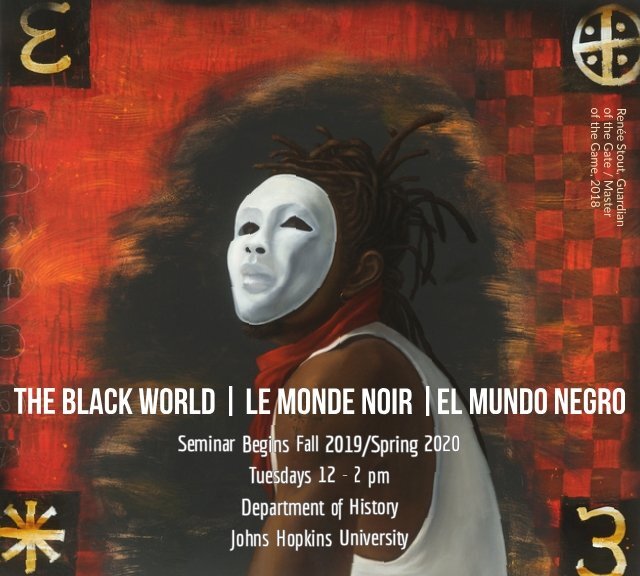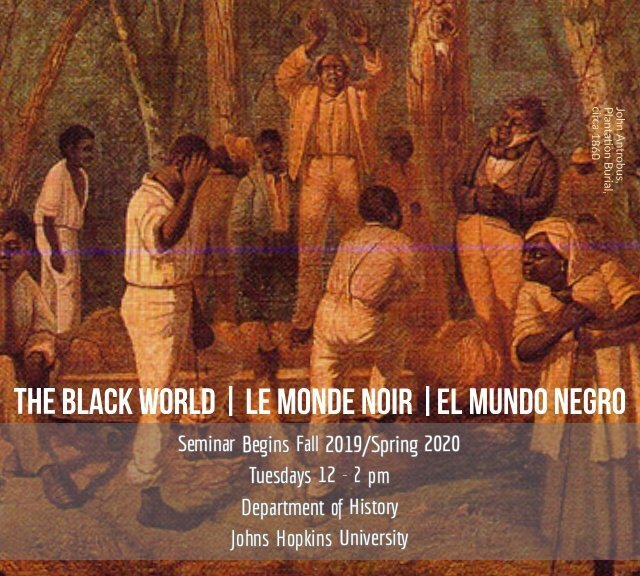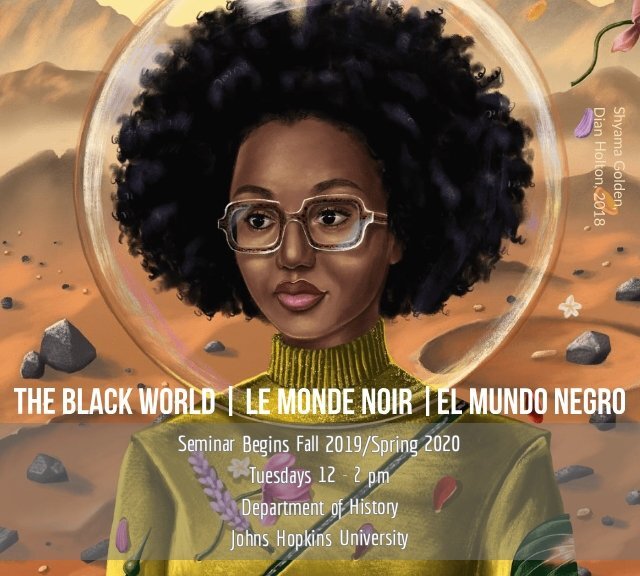Come Celebrate a Black World
Palimpsest: Harvey Luksenburg, “Genovese Views the Black,” JHU News-Letter, April 14, 1970, p. 2 x Defend Black Women March, June 19, 2020 | @blkwomenradicals on Twitter
“Genovese is apparently respected by his colleagues. ‘He takes certain economic factors very seriously,’ says Dr. Jack Greene of the History Department, ‘I think he's a Marxist in the sense that all historians are Marxists. He has been much more active in applying Marxist principle than others. Of the people who call themselves Marxists, he is the only real one. Most of the new—leftist guys are very sentimental—they tend to see things in very black and white terms.’ The academic tone of the symposium was occasionally interrupted by shouts from black women in the audience. They apparently felt that the black's situation was being oversimplified by the historians.”
—Harvey Luksenburg, “Genovese Views the Black,” JHU News-Letter, April 14, 1970, p. 2 (emphasis added)
The great poet Lucille Clifton—a black woman and Baltimore native—captured the fact of blackness perfectly: “Come celebrate with me that everyday something has tried to kill me and failed.” It’s an invitation, first, but one quickly followed with a clear and unvarnished recounting of an attempted annihilation.
The Johns Hopkins History Seminar attempted to annihilate blackness over and over again. The second Ku Klux Klan received its literary and historiographical birthplace through the work of Thomas Dixon and Woodrow Wilson there. In 1970, the first course taught by a Black history grad student precipitated his being called a “jive nigger” in the campus paper. In 1979, a senior white faculty member drove out the first black faculty member ever hired by the university, purportedly because: "We already had a black person in the department.” It is where, in 2008, a different senior white faculty openly excluded candidates of color from a job search on the basis of the department already having a “Race Guy.”
In the face of attempted annihilation, the Black World Seminar offers a Lucille Clifton’s kind of celebration.
“To steal again from Putney Swope, Frank Moorer is a jive nigger. At least from a (demonic) white point of view.”
Topically, the Black World Seminar attends to the making and meaning of blackness between the fifteenth and twentieth centuries. It considers the push and pull factors that snatched people out of Africa and drew people of African descent to travel and build lives around the world in the modern era. It explores, too, the historical forces which created blackness as a marker on the body and as a political and cultural identity. In commencing chronologically with the Middle Passage, Black World Seminar pays special attention to processes of diaspora, moments of dislocation, the fashioning of memory, and to gendered, racialized and generational encounters with capitalism. In the seminar’s thematic emphasis on Black Studies as a field, attendees also interrogate how Black World methodologies—questions of evidence, narrative form, and such—developed in response to different political contexts, mostly those of what’s generally considered “The West.”
But, in addition to reading works of Black History, the Black World Seminar considers what it means to write history “Black.” How do authors challenge white supremacy— bibliographically, methodologically, compositionally, and archivally? How do they exercise and exhibit blackness as a set of descriptive and interpretive commitments? Far more than a physical marker, after all, blackness also represents an epistemology—a way of knowing—or what at times has been called “black knowledge.” The Black World Seminar thus treats black knowledge as a library of works, a cluster of methodologies, and as interlocking modes of analysis and critique.
The classic combination of research-in-process and debates about key concepts mirrors the earliest iterations of the Hopkins Seminar. But in place of certain martial practices or pre-occupations with “high” (i.e. white) politics typical of the original seminar table, the Black World Seminar professes and emphasizes its roots in social history, cultural studies, and Black Feminism. As initially designed at their founding at the Johns Hopkins University in the late nineteenth century, history seminars sought some higher truth by bringing into conflict competing sources or narratives, but almost always doing so within a shared epistemological the frame about the superiority of Europe, the strength of men, and the irrefutability of documented, empirical evidence.
In contrast, the Black World seminar is a “kitchen table” seminar.
Black Women created the Black World Seminar. I took it for its first spin as its inaugural moderator in Fall 2019, but the tipping point for its establishment came with the arrival of Profs. Martha Jones and Jessica Marie Johnson a few years earlier. The pair represent “Black Firsts” for Hopkins in their own respective rights. Johnson arrived in 2016 as the first Black or Latinx woman hired at any rank by the Department of History. Jones became, that same year, the first woman of color appointed as Full Professor in the history of the Humanities at the university. They team taught the university’s first course dedicated to the history of Black Women in Spring 2019, and that course, in many ways, became the feeder for the Black World Seminar, held the following fall.
The Black World Seminar could only have happened (and can only continue) through a combination of protest in the streets and on college campuses, unrest culminating in 2015 but originating over one hundred years before. Student activism in 2015 led to the hiring of a critical mass of black, Americanist faculty. In 2016, I became the first black faculty member to rise through the ranks and achieve tenure in the field of United States history at Hopkins. That same year brought Prof. Lawrence Jackson from Emory to become the university’s first black distinguished professor, also with a partial appointment in History. Prof. Sasha Turner, specialist in Caribbean History, joined the department this year, with still another prominent historian of the black radical tradition slated to join us in 2021. From the founding of the seminar, as an approach to teaching, in 1878, to the inaugural Black World Seminar in 2019, it took 131 years before the black experience in and of History—as a field and a lens through which scholars conducted research—secured a collective and regular institutional place in America’s oldest research university.
Time Magazine from June 22/29 2020 and May 11, 2015. Cover images by Devin Allen, local Baltimore activist and photographer.
But people alone don’t comprise “culture,” although you can’t have a “culture” without them. Culture takes praxis. In my case, I came to Hopkins practiced in critical materialist approaches to political economy, American and Caribbean history, and a commitment to comparative critical race theory. My interpretive North Stars were the likes of Michel-Rolph Trouillot, Stuart Hall, Barbara Jean Fields, Tom Holt and the like. But in all my radical thought work, I remained wed to the seminar table as an idea. I accepted it (and sometimes still do) as a site of intellectual performance, occasionally combat. (When I came of age professionally within the Hopkins seminar, the department had practically no memory of the 1970 conference on Free Blacks mentioned in the epigram, and certainly no memory of the black women who “interrupted,” with shouts, the “oversimplification” of the seminar as an exercise.)
Among the many and distinctly innovative Black World scholars now on faculty, Prof. Jessica Marie Johnson brought the kitchen table ethos into seminar culture at Hopkins. Articulated most notably by Barbara Smith and Audre Lorde, two founders of Kitchen Table Press in 1980 (and warriors in American Letters well before that), a kitchen table approach situates the production of words and arguments within several intersecting fields of power. The kitchen is a place of women’s work, in many cases and under often coercive conditions black women’s work. The kitchen table, though, also offers a source of crucial social reproduction, support, and collaboration. It’s a space of story-telling, economics, discipline, healing, and sustenance. It’s a platform and stage for theoretical and experiential learning. And for food. Always food.
We had lunch at every Black World Seminar. And over noontime meals, we exchanged the food of history (capitalized and lower-case). A kitchen table ethos, at its best, means recognizing expertise without imposing hierarchies. It includes respecting generational knowledge and experience—as historical evidence—without that evidence becoming a cudgel. Now, of course, anyone who’s made missteps in the kitchen under the watchful eye of an elder knows that the kitchen does not exist absent power. But it’s a power divorced from transactions and the profit motive. It’s the power of teaching. Therefore, the kitchen table, in perhaps only this way, works just like the seminar table. It offers a place to teach.
On the walls all around us during all the Black World teaching, eating, and story-telling from this past year peered the eyes of bronze sculptures, marble busts, and gold framed pictures, each and every one (save one, a picture of Franklin W. Knight) representing a former white historian. Each and every one (save three, Sara Berry, Dorothy Ross, and Willie Lee Rose) portrays a man. Held in such a context, the Black World Seminar teaches the very space of the Hopkins History seminar room to mean something different. Its décor, intended as the assertion of “tradition,” becomes the very thing undergoing the process of correction.
Still, what lasts long past the correction is the food. And what outlives the food are the stories and wisdom conjured in the food’s making. The Black World Seminar thus provides a nourishment long in the making, promising a world still in the coming. It is where the struggle continues and where one finds freedom from always having to fight. Come and celebrate with me. With us.
Black World Seminar, Fall 2019 | Credit: Jessica Marie Johnson
—The Watchman (the scholar formerly known as N. D. B. Connolly)
N. D. B. Connolly writes about capitalism, racism, migration and the built environment while decolonizing the Herbert Baxter Adams chair in the Department of History at the Johns Hopkins University.








